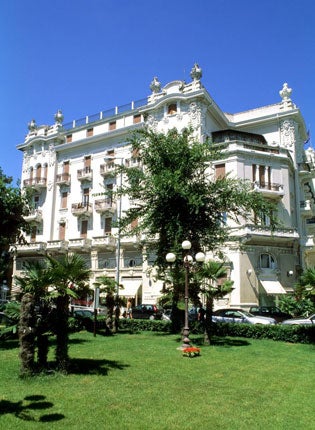Economic gloom shuts the hotel where Fellini lived la dolce vita

It won't be lost on many Italians that la dolce vita in Italy has turned rather sour when even The Grand Hotel in Rimini is, for the first time in its history, preparing to shut for the winter.
The palatial hotel, so beloved of film maker Federico Fellini, will close from January to Easter, its owners have announced, as Italy's economic crisis bites and the demand for five-star watering holes – even ones as mythical as this – goes into hibernation.
It was officially listed as an Italian national monument in 1994, and featured in many of Fellini's films, most notably as a sumptuous backdrop in his 1973 picture Amarcord, a coming-of-age comedy, in which he took liberal swipes at Mussolini and the Catholic Church.
The current proprietor, Antonio Batani, said plain financial necessity had forced his hand. "It's a painful decision but I really had no choice," he said. At the moment, we've had about 30 guests and around 70 staff who each cost about €2,500 a month in wages and contributions. It doesn't take much to do the sums." The hotel has 117 guest rooms and suites.
Patrizia Rinaldis, the president of the local hoteliers association, told La Stampa newspaper: "It's a awful sign. We wouldn't want any others to follow."
The building, designed by Paolo Somazzi, a South American architect, opened in the summer of 1908 and remains the only five-star hotel in Rimini – and the only one with a private beach. Its imposing appearance is complemented by rooms decorated with 18th-century Venetian and French antiques, together with original, restored parquet floors and chandeliers.
Famous names from Guglielmo Marconi and Mussolini to Princess Diana have visited. But it was film legend Fellini who put the Grand Hotel on the map.
The maker of La Dolce Vita and Satyricon, who was born locally, was said to have gazed through the Grand Hotel's gates as a child, thus initiating his ambiguous, life-long relationship with the highlife. The building formed the backdrop to several scenes in Amarcord. And once the money started to roll in, Fellini was a regular guest with his own favourite suite. It was here in 1993 that he suffered a stroke and collapsed before dying in a Rome hospital a couple of months later.
The regional tourism councillor, Maurizio Melucci, added his voice to those hoping the winter closure of the building was a one-off. "I hope this is just a temporary measure," he said. "The Grand Hotel is not only the symbol of Rimini and Italy for the summer but for the whole 12 months of the year.
In the last couple of weeks, however, there were new signs that the output of Italy's sclerotic and debt-bound economy was falling again. Nearly four million Italians are now below the poverty line, and even the better-off are having to tighten their belts.
The Grand Hotel's time will probably come again, and the dolce vita may return. But for now, people are battening down the hatches for winter.
Subscribe to Independent Premium to bookmark this article
Want to bookmark your favourite articles and stories to read or reference later? Start your Independent Premium subscription today.

Join our commenting forum
Join thought-provoking conversations, follow other Independent readers and see their replies